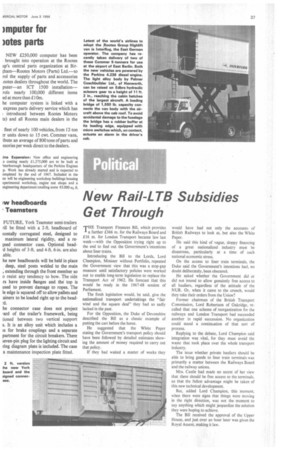New Rail-LTB Subsidies Get Through
Page 39

If you've noticed an error in this article please click here to report it so we can fix it.
THE Transport Finances Bill, which provides a further £366 m. for the Railways Board and £16 m. for London Transport became law last week—with the Opposition trying right up to the end to find out the Government's intentions about liner trains.
introducing the Bill to the Lords, Lord Champion, Minister without Portfolio, repeated the Government view that this was a stop-gap measure until satisfactory policies were worked out to enable long-term legislation to replace the Transport Act of 1962. He forecast that this would be ready in the 1967-68 session of Parliament.
The fresh legislation would, he said, give the nationalized transport undertakings the "fair wind and the square deal" they had so sadly lacked in the past.
For the Opposition, the Duke of Devonshire described the Bill as a classic example of putting the cart before the horse.
He suggested that the White Paper stating the Government's transport policy should have been followed by detailed estimates showing the amount of money required to carry out that policy.
If they had waited a matter of weeks they
would have had not only the accounts of British Railways to look at, but also the White Paper.
He said this kind of vague, sloppy financing of a great nationalized industry must be disastrous, particularly at a time of such national economic stress.
On the access to liner train terminals. the Duke said the Government's intentions had, no doubt deliberately, been obscured.
He asked whether the Government did or did not intend to allow genuinely free access to all hauliers, regardless of the attitude of the NUR. Or, when it came to the crunch, would they take their orders from the Union?
Former chairman of the British Transport Commission, Lord Robertson of Oakridge, recalled that one scheme of reorganization for the railways and London Transport had succeeded another in rapid succession. No organization could stand a continuation of that sort of process.
Replying to the debate. Lord Champion said integration was vital, for they must avoid the waste that took place over the whole transport industry.
The issue whether private hauliers should be able to bring goods to liner train terminals was primarily a matter between the Railways Board and the railway unions.
Mrs. Castle had made no secret of her view that there should be free access to the terminals. so that the fullest advantage might be taken of this new technical development.
But, added Lord Champion, this moment, when there were signs that things were moving in the right direction, was not the moment to say anything which might jeopardize the solution they were hoping to achieve.
The Bill received the approval of the Upper House, and just over an hour later was giyen the Royal Assent, making it law.








































































































































































